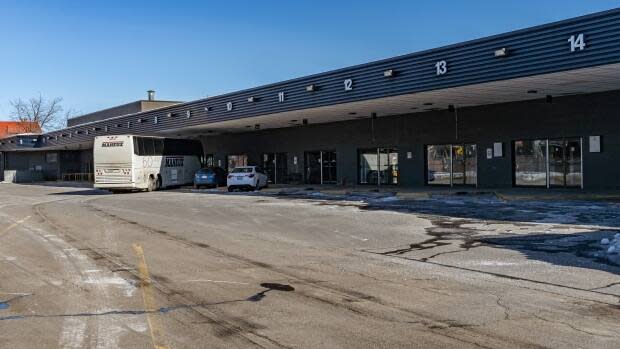'Everything is on the table' for former Greyhound station, says developer

The real estate development company that now owns Ottawa's former Greyhound bus terminal land says it's committed to consulting the community before developing the land.
"Everything is on the table," said Jessy Desjardins, Brigil's vice-president of development and design, adding that the company is still working on how it will receive feedback from stakeholders. The sale of the land was finalized Monday.
Last month, Brigil said the one-hectare Ottawa Central Station site on Catherine Street is "a prime location for a prestigious project promoting urban densification." Greyhound bus services remain suspended across Canada and the transportation company has not announced a new terminal location in Ottawa.
Plans were said to be underway to build a multi-use space featuring apartments, luxury rental condos, office space, hotel buildings, restaurants and retail stores.
This week, Brigil fine-tuned that vision. Desjardins, son of founder Gilles Desjardins, says the company is looking to Copenhagen for inspiration.
Desjardins said the company will invite designs from architectural firms in Ottawa, Montreal and Toronto. The best concepts will be presented to stakeholder groups including politicians, merchants and citizens.
At the centre of Brigil's vision is the concept of "the 15-minute walkable neighbourhood," where cars would be unnecessary.
To that end, lower levels of a building that might be as tall as 27 storeys would be clad in brick at street level, and house a mixture of office and retail space. Upper stories would blend townhouse style condominiums along with rental accommodations, including some priced affordably, said Desjardins.

"We're not a big fan of just creating affordable housing on its own. We like to see it as a mixture in the building."
It was the COVID-19 pandemic that killed the business model of Greyhound, the iconic bus company that offered affordable, long-distance travel and operated on the land since 1994. Desjardins says his company believes the migration of people and businesses out of the inner core is temporary and that Brigil's acquisition of the bus station lands is not a gamble.
"Urban cores are the centre of everything," said Desjardins. "Once everything resumes, people are going to want to see each other, see shows, music festivals."
Desjardins said the first phase of construction would likely not start until 2023.
'Long time coming'
"It's been a long time coming," said Ray Sullivan, executive director of Centretown Citizens Ottawa Corporation which owns and operates over 50 properties in the city.
"I'm all in favour of intensification, especially close to transit and road corridors, as that site is."
Sullivan said there was a long history of groups like his calling for more affordable housing in Centretown and that the city should act on its commitment to affordable housing now.
"When the city increases the zoning on a site like that, up to 27 storeys, they're literally creating value, they're creating wealth, out of thin air for that owner," he said. "What are we going to get as a neighborhood in return for that value the city created?"
Mindy Sichel, president of the Centretown Community Association, said news that the bus station was gone forever had initially saddened her.
"I think it's a big loss for the downtown area," she said.
She hopes a design competition would lead to a building that's "more interesting and not boring" compared to others recently constructed in Centretown.

